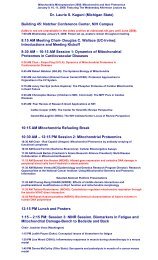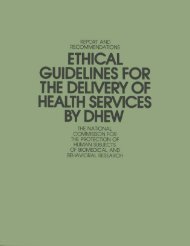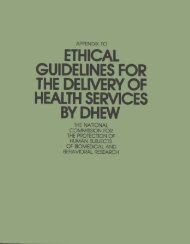RESEARCH ON THE FETUS - National Institutes of Health
RESEARCH ON THE FETUS - National Institutes of Health
RESEARCH ON THE FETUS - National Institutes of Health
You also want an ePaper? Increase the reach of your titles
YUMPU automatically turns print PDFs into web optimized ePapers that Google loves.
(2) The knowledge to be gained must be important and obtainable by<br />
no reasonable alternative means.<br />
(3) Risks and benefits to both the mother and the fetus must have<br />
been fully evaluated and described.<br />
(4) Informed consent must be sought and granted under proper conditions.<br />
(5) Subjects must be selected so that risks and benefits will not fall<br />
inequitably among economic, racial, ethnic and social classes.<br />
These requirements apply to all research on the human fetus. In the<br />
application <strong>of</strong> these principles, however, the Commission found it helpful to consider<br />
the following distinctions: (1) therapeutic and nontherapeutic research;<br />
(2) research directed toward the pregnant woman and that directed toward the<br />
fetus; (3) research involving the fetus-going-to-term and the fetus-to-be-aborted;<br />
(4) research occurring before, during or after an abortion procedure; and<br />
(5) research which involves the nonviable fetus ex utero and that which involves<br />
the possibly viable infant. The first two distinctions encompass the entire period<br />
<strong>of</strong> the pregnancy through delivery; the latter three refer to different portions<br />
<strong>of</strong> the developmental continuum.<br />
The Commission observes that the fetus is sometimes an unintended subject<br />
<strong>of</strong> research when a woman participating in an investigation is incorrectly presumed<br />
not to be pregnant. Care should be taken to minimize this possibility.<br />
C. Application to Research Involving the Fetus. The application <strong>of</strong> the<br />
general principles enumerated above to the use <strong>of</strong> the human fetus as a research<br />
subject presents problems because the fetus cannot be a willing participant in<br />
experimentation. As with children, the comatose and other subjects unable to<br />
consent, difficult questions arise regarding the balance <strong>of</strong> risk and benefit and<br />
the validity <strong>of</strong> proxy consent.<br />
In particular, some would question whether subjects unable to consent<br />
should ever be subjected to risk in scientific research. However, there is<br />
general agreement that where the benefits as well as the risks <strong>of</strong> research accrue<br />
to the subject, proxy consent may be presumed adequate to protect the subject's<br />
interests. The more difficult case is that where the subject must bear risks<br />
without direct benefit.<br />
64











